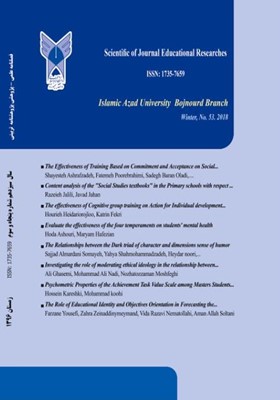Investigating the role of moderating ethical ideology in the relationship between ethical leadership, organizational justice and occupational attachment.
Subject Areas : Educational Scienceali ghasemi 1 , mohammadali nadi 2 , Nozhatozaman Moshfeghi 3
1 - Master of Educational Administration, Faculty of Education and Psychology, University of Isfahan, Isfahan, Iran
2 - Associate Professor, Faculty of Education and Psychology, Islamic Azad University of Isfahan, Isfahan, Iran
3 - PhD Student, Islamic Azad University, Isfahan (khorasgan), Department of Educational Management, Isfahan, Iran
Keywords: "moral ideology", "ethical leadership", " organizational justice", " Occupational Attachment",
Abstract :
The purpose of this study was to investigate the role of moderating ethical ideology in relation to ethical leadership, organizational justice and occupational attachment among managers of southwest schools in Isfahan. The correlation method and the statistical population of the study were 263 people. A questionnaire was used to measure the variables of the research, which included 73 items and 7 sub-scales. All of the managers responded to self-reporting questionnaires. Data analysis was performed with a statistical package in the social sciences version 22 and MODPROBE software based on Andrew F. Hayes's method, with frequency, percentage, mean and standard deviation, Pearson correlation coefficient and modulation hierarchical regression analysis. There is a significant relationship between predictive variables with occupational attachment. In the relationship between ethical leadership and organizational justice, with the professional attachment of ethical ideology, managers play a moderating role. (05/0> P). Organizational justice interaction with ethical relativism of 3% and ethical idealism explains 25% of the variance of occupational attachment, and only the interaction of moral idealism and organizational justice for occupational attachment has been significant. The interaction of ethical leadership with ethical relativism of 12% and ethical idealism explains 25% of the variance of job attachment. Accordingly, the greater the ethical philosophy of idealism in the individual, the greater the organizational justice effect on occupational attachment, and ultimately the moral leadership in engaging with the ethical ideology increases occupational attachment.
_||_


